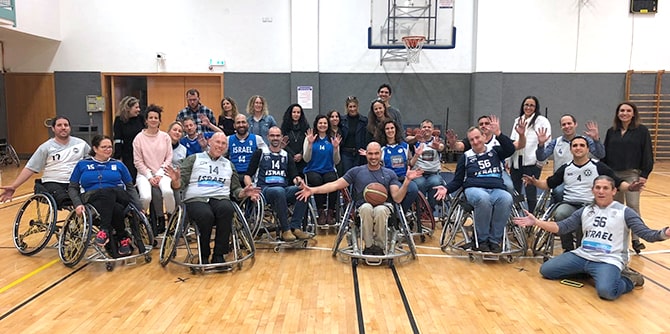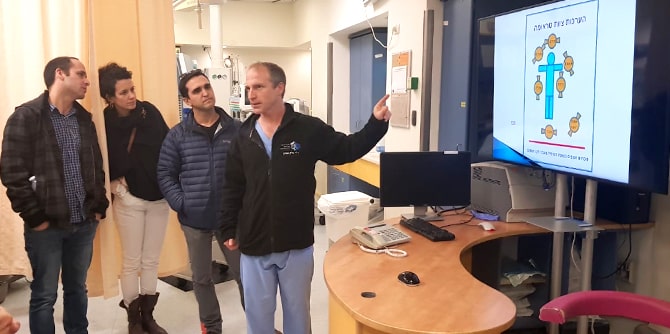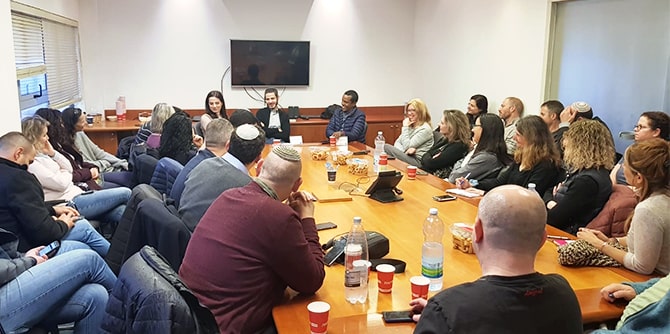The Whole is Greater Than the Sum of Its Parts
A seminar that focused on diversity and difference as a resource, and explored values-based and administrative aspects of working with diverse staffs
January 30, 2020
Diversity and integration of employees from different cultural and social backgrounds is a complex issue, so much so that many organizations do not take on the challenge of diversifying the workforce. On January 30th, graduates of Cohorts 24 and 25 of the Mandel School for Educational Leadership participated in a winter seminar that explored values-based and administrative aspects of building and leading heterogeneous work staffs. The seminar focused in particular on gender equality and on integrating minority groups and people with disabilities into the workplace.
The two-day seminar sought to raise awareness of the fact that employee diversity is a leadership and managerial task that requires willpower and conscious decision-making – not only in order to see those who are different, but also in order to actively choose to employ and integrate such people. The seminar presented different models of diverse staffs and discussed their advantages in terms of “the whole is greater than the sum of its parts,” while at the same time focusing on the challenges that stem from intra-organizational diversity and difference.

The seminar began with a meeting at the Beit Halochem center for disabled IDF veterans in Jerusalem. The graduates were welcomed by Moshe Vigdor, director general of the Mandel Foundation–Israel, and Danny Bar Giora, director of the Mandel School for Educational Leadership. Sharona Bar-Nes, the senior staff member of the Mandel Graduate Unit who initiated the seminar, opened the event by referring to content of the weekly Torah portion as it related to the topic at hand. “Most of us tend to choose those who are similar to us and whom we view as perfect," she said. "In most cases this is an unconscious choice. This seminar is designed to raise questions and to increase our awareness of this habit.”
Next, the graduates met with Roei Bentolila, who was severely wounded during his IDF military service as an officer in the elite Maglan commando unit. Roei spoke about the dramatic personal change he underwent following his injury, and explained that his greatest fear was that he would no longer be able to play a meaningful role in the lives of others. He is now the founder of a company that is involved in leadership development in both the business world and the social sector. He also plays wheelchair basketball at Beit Halochem, and has played competitively in Israel and abroad as a member of Israel's national team for the last six years.
Roei described his rehabilitation process and his work in leadership development and team building, with an emphasis on people’s natural individual abilities. At the end of the visit, the graduates put together a team that played wheelchair basketball against Roei and Nadav, one of his fellow Beit Halochem team-members. Unsurprisingly, the graduates were soundly beaten.
The graduates then visited the Shaare Zedek Medical Center, where they heard from director general Professor Ofer Merin about the value the hospital places on intra-organizational diversity and about the benefits of heterogeneity for the organization. Professor Merin also shared some of the ethical and moral dilemmas he faced when he headed an aid delegation to Nepal following the 2014 earthquake, and spoke about the professional dilemmas that cultural differences raised for the medical teams there. Dr. Alon Schwartz, director of the hospital’s trauma unit, emphasized the importance of heterogeneity as a value, and demonstrated how it is expressed in the work of the diverse teams in the department he heads.

In the evening, Adv. Mor Barzani, head of the employment diversity division of Israel's Civil Service Commission, told the graduates about the government’s efforts to introduce regulations that would promote diversity. She noted the influence of these efforts on national resilience and on the public's trust in the establishment. After this presentation, the graduates took part in a group activity in which they reviewed their experiences and identified the main insights they gained from the day’s encounters. They also discussed the question of how best to implement employment diversity policies.
The graduates began the second day of the seminar with a visit to the Israel Television News Company, where they were addressed by a panel of journalists comprising Daphna Liel, Knesset affairs correspondent; Branu Tegene, criminal affairs correspondent; and Yair Sherki, religious affairs correspondent. The panel was moderated by Dr. Diana Daaboul and Assael Sharir, graduates of Cohort 24 of the Mandel School for Educational Leadership, who interviewed the journalists about news and commentary, discussed how difference can become a resource in their particular professional fields, and examined the impact of diversity on the discourse of news and on ratings.
After the panel, the graduates toured the news facility and saw how cooperation between different staff members and other individuals is characteristic of the journalistic process from beginning to end, from early stages of work through the final broadcast on television. Ilana Sarig Hughes, graduate of Cohort 25 of the Mandel School for Educational Leadership and director of the Social Cohesion Leadership Program at the Merchavim Institute (a nonprofit organization working to develop heterogeneous organizations that integrate different populations into Israeli society), raised questions and shared insights from the field on the issue of social diversity and social cohesion.

The seminar was brought to a close by Dr. Yehuda Maimaran, graduate of Cohort 3 of the Mandel School for Educational Leadership and a senior consultant to the Mandel Graduate Unit, who led a review process in which graduates gave feedback and arrived at insights. The seminar was designed and led by Dr. Maimaran in collaboration with senior staff member Sharona Bar-Nes, as well as Hanna Yamin Sherky and Chaim Shmila, two graduates of Cohort 25 of the Mandel School for Educational Leadership.
